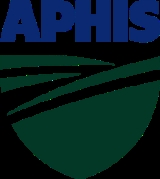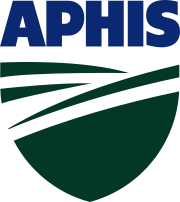
Animal and Plant Health Inspection Service
Encyclopedia

United States Department of Agriculture
The United States Department of Agriculture is the United States federal executive department responsible for developing and executing U.S. federal government policy on farming, agriculture, and food...
(USDA) responsible for protecting animal health, animal welfare, and plant health. APHIS is the lead agency for collaboration with other agencies to protect U.S. agriculture from invasive pests and diseases. APHIS is the National Plant Protection Authority for the U.S. government, and the agency's head of veterinary services is Chief Veterinary Officer of the United States.
History
APHIS was created in 1972 by Secretary’s Memorandum No. 1769.The origins of the agency predate creation of USDA, to 1854 when the Office of Entomologist, Agricultural Section, U.S. Patent Office was created. It was the first of three agencies that eventually were merged to form APHIS. In 1881, a Cattle Commission was created in the Department of the Treasury that three years later was transferred to USDA. Plant quarantine functions followed in 1912 when USDA's Federal Horticultural Board was created. Between the 1880s and 1930s these evolved into the USDA Bureaus of Entomology, of Animal Industry, and of Plant Quarantine, respectively.
In 1953 the three bureaus were combined into the Agricultural Research Service. In 1971, the animal and plant regulatory functions were separated from ARS to create a new entity known as Animal and Plant Health Services. In 1972, the meat and poultry inspection divisions of the Consumer and Marketing Service (later known as the Agricultural Marketing Service
Agricultural Marketing Service
The Agricultural Marketing Service is a division of the United States Department of Agriculture, and has programs in five commodity areas: cotton and tobacco; dairy; fruit and vegetable; livestock and seed; and poultry...
) were added to APHS, thus creating the contemporary APHIS.
In 2003, many APHIS agricultural border inspectors were transferred to U.S. Customs and Border Protection
U.S. Customs and Border Protection
U.S. Customs and Border Protection is a federal law enforcement agency of the United States Department of Homeland Security charged with regulating and facilitating international trade, collecting import duties, and enforcing U.S. regulations, including trade, customs and immigration. CBP is the...
, a unit of the U.S. Department of Homeland Security.
APHIS is the primary agency responsible for responding to animal and plant disease(s)and pest emergencies as well as to other emergencies as set forth by the National Response Plan (NRP) completed in 2005 (APHIS Strategic Plan 2003-2008).
Duties and Responsibilities
The originally stated purpose of APHIS is to “protect the animal and plant resources of the nation” and carry out “a poultry and meat inspection program.” A more modern articulation of APHIS’s mission is “protecting and promoting U.S. agricultural health, regulating genetically engineered organisms, administering the Animal Welfare Act and carrying out wildlife damage management activities.”APHIS aims to protect American animals, plants, and the agricultural industry by offering:
- Protection from invasive non-native plants, animals, insects, and diseases
- Monitoring and management of existing agricultural pests and diseases
- Resolution and management of trade issues related to animal or plant health
- Prevention or cessation of the inhumane treatment (of animals)
The threats and challenges within APHIS' scope include:
- Non-compliant biotech events
- Invasive species
- Agricultural animal/plant health threats
- Agricultural bioterrorism
- Sanitary and phytosanitary trade barriers
- Wildlife conflicts and diseases
- Zoonotic diseases
- Animal welfareAnimal welfareAnimal welfare is the physical and psychological well-being of animals.The term animal welfare can also mean human concern for animal welfare or a position in a debate on animal ethics and animal rights...
issues
Statutory authorities
APHIS is granted specific authority under several federal statutes:Animal Health Protection Act, et seq.
Governs the prevention, detection, control, and eradication of diseases and pests of animals, where "animal" is defined as "any member of the animal kingdom (except a human)." (1) (West 2009).
Animal Welfare Act (Laboratory Animal Welfare Act of 1966), et seq.
Originally intended to prevent the theft of pets for sale to research facilities, the AWA now broadly regulates minimum standards of care and treatment of animals in research, exhibition, transport, and by dealers. It exempts birds, rats, or mice bred for use in research, horses not used for research, cold blooded animals, and all farm animals used in the production of “food and fiber.” It provides for licensing and registration of all animal dealers and exhibitors.
Horse Protection Act
Horse Protection Act of 1970
The United States Horse Protection Act of 1970 makes it a crime to exhibit, or transport for the purpose of exhibiting, any sored horse...
,
Prohibits horses subjected to a process called “soring” (injecting or applying chemicals to a horse’s forelegs to accentuate its gait) from participating in and being transported to exhibitions, sales, shows, or auctions.
Animal Damage Control Act of March 2, 1931,
Provides broad authority for investigation, demonstrations and control of “injurious animal species” (mammalian predators, rodents and birds.) Amended in 1991 to prevent the inadvertent introduction of brown tree snakes into other areas of the United States from Guam.
Lacey Act,
Makes it unlawful for any person to import, export, transport, sell, receive, acquire, or purchase any fish or wildlife or plant taken, possessed, transported, or sold in violation of any law, treaty, or regulation of the United States or in violation of any Indian tribal law whether in interstate or foreign commerce.
Plant Protection Act, et seq.
Consolidates all or part of ten existing USDA plant health laws into one comprehensive law. Gives USDA the authority to regulate and to prohibit or restrict the importation, exportation, and the interstate movement of plants, plant products, certain biological control organisms, noxious weeds, and plant pests.
Federal Seed Act, Title III,
Requires accurate labeling and purity standards for seeds in commerce, and prohibits the importation and movement of adulterated or misbranded seeds.
Honeybee Act,
Prohibits or restricts the importation or entry of honeybees and honeybee semen into or through the United States in order to prevent the introduction and spread of diseases and parasites harmful to honeybees, as well as genetically undesirable germ plasm and undesirable bee species.
Animal quarantine laws:
allows the President, by proclamation, to suspend the importation of all or any class of animals for a limited time, whenever, in his opinion, it is necessary for the protection of animals in the United States against infectious or contagious diseases.
authorizes the Secretary of Agriculture to establish research facilities for hoof and mouth disease and other animal diseases which “in the opinion of the Secretary” constitute a threat to U.S. livestock. Mandates strict controls for the use of any live virus at such research facilities. Permits the Secretary to hire up to five technical experts or scientists at a maximum paygrade of GS-18. (This appears to be one of the most prescriptive statutes that USDA administers.)
authorizes the Secretary of Agriculture to establish and carry out a program for the eradication of pseudorabies in United States swine populations.
Virus-Serum-Toxin Act,
Organization
APHIS is divided into six operational programs units (Animal Care, Biotechnology Regulatory Services, International Services and Trade Support Team, Plant Protection and Quarantine, Veterinary Services, and Wildlife ServicesWildlife Services
Wildlife Services is the program that provides Federal leadership and skill to resolve wildlife interactions that threaten public health and safety and agricultural, property, and natural resources...
), three management support units (Legislative and Public Affairs, Marketing and Regulatory Programs Business Services, and Policy and Program Development), and two offices that support government-wide initiatives, the Office of Emergency Management and Homeland Security and Office of Civil Rights Enforcement and Compliance.
The current APHIS Administrator, Dr. Gregory Parham, was appointed in April 2011. His immediate predecessor, Cindy Smith, was appointed in September 2007. She was the first female Administrator of the Animal and Plant Health Inspection Service.
The Deputy Administrator for Veterinary Services also functions as Chief Veterinary Officer of the United States, and represents the U.S. Government at the World Organization for Animal Health (OIE). APHIS Plant Protection and Quarantine (PPQ) is the National Plant Protection Authority; the Deputy Administrator for PPQ represents the United States in the North American Plant Protection Organization
North American Plant Protection Organization
The North American Plant Protection Organization , is the phytosanitary standard setting organization recognized by the North American Free Trade Agreement...
and other international fora related to plant health and quarantine.
In addition to its domestic operations, APHIS International Services staff several overseas offices, including veterinary and plant health attachés in U.S. diplomatic missions as well as technicians carrying out disease and pest eradication and control programs.

